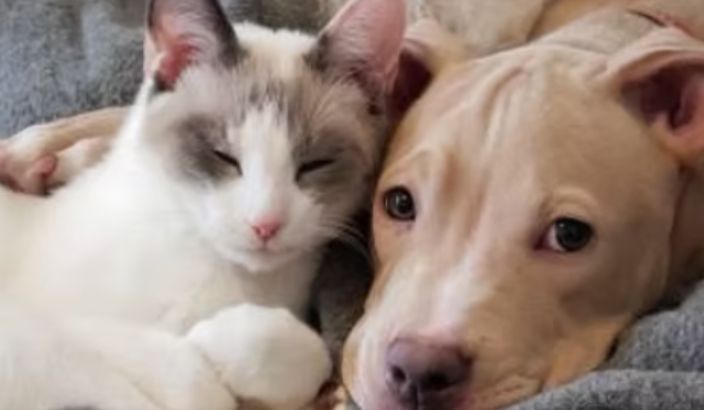Sponsored: Making a Difference, One Paw at a Time


Photo: Supplied.
When founders of Marlborough Four Paws, Michelle and Leslie, set up the animal rescue charity in 2017, they never dreamt it would grow to the size it has today.
“I had 50 kittens at home that I’d rescued and it was a nightmare,” says Michelle. “We really began our journey though after seeing puppies being given away irresponsibly on Facebook, often to people who were ill-prepared to care for them. We stepped in, rescuing a few of them, ensuring they were checked by vets, desexed, and placed in loving homes. Fortuitously I met Liz from local restaurant Arbour, Marlborough Four Paws had already been pledged enclosures from a very supportive local couple and she said why don’t we find a site and establish a proper facility.”

“That set the wheels in motion. It was incredible the way the community and local businesses came together to raise the money and provide materials. Liz and I were running cement in wheelbarrows in 32-degree heat for quite some time but with everyone’s help we got the job done while Leslie looked after the finances.”
Marlborough Four Paws operates on the principle that every animal deserves a better life. The the biggest challenge faced by all animal welfare organisations today is the overbreeding of animals due to the lack of desexing, with people unaware of the consequences of allowing pets to breed. “I have seen kittens get pregnant at 5-month-old,” says Michelle. “A single litter of kittens can result in a terrible cycle of overpopulation and unwanted animals that often get dumped.”
In one week alone recently, the team has had 70 cats desexed. “We hope to desex 600 to 800 cats this year. We have already done well over 200.” This comes at great cost despite the incredible support from Vet Marlborough and Springlands Vet Centre. “Our vet bill in January was $18,000 and that’s without any food, flea treatment or other requirements.”
The organisation currently has 145 animals in its care, 20 are dogs and puppies with most of the rest being cats and kittens.
Marlborough Four Paws mission extends beyond simply rescuing animals - they also provide crucial support to some people in the local community who are struggling to care for their beloved local communities. They assist pet owners who are struggling financially, offering subsidised desexing and providing food for families who cannot afford it. “There are some wonderful pet owners who love their animals but are struggling to find the money to look after them. We recognise how important these companion animals are and do our best to help them out.”
Volunteers are at the heart of Four Paws Marlborough and there are 120 of them. “We always need more,” says Michelle, “especially now that we have our Op Shop open to help raise funds for our work. Volunteers are also needed for two-hour shifts at the pet facility helping with daily care, such as cleaning and feeding.
Every single cent raised to help the charity goes to the care of the animals. Michelle, like many others involved, works full time at another job. “I do 40 hours a week at Ray White Real Estate and around 50 hours with the animals.” The work doesn’t stop at night either. Michelle and volunteer Gabby do nightly trips around Marlborough looking for dumped animals in trash bins and the like and trapping wild ones. “We have to go around again at 5am in the morning to pick up any we have caught and ascertain their needs as quickly as possible. Fortunately, there are a number of wonderful volunteer foster families who help out providing temporary homes. We can always do with more of them.”
The hardest thing to deal with is the abused and horribly mistreated animals of which Marlborough Four Paws sees hundreds each year. New Zealand comes up very poorly in the international animal abuse statistics. Sadly, many of
the animals that come into the rescue are in dire conditions. From broken bones to internal injuries, many have suffered unimaginable treatment from their owners such as a cat whose leg was broken and never treated so it fused facing the wrong direction. The rescue works tirelessly to ensure that these animals are given medical care, love, and a chance at a better life. “I can only cope with this side of it because I know I can do something to help,” says Michelle.
As a deeply committed volunteer, Liz can’t praise Michelle, Leslie, Gabby and the organization enough. “Doing something you’re passionate about with a group of like-minded people is an incredible experience. We are constantly bombarded with bad news in the media and it can leave you feeling helpless. This is something so positive to do because you know you can help in a way that has real value to the lives of both animals and people.”

“Many local businesses like ours are involved in helping out because we recognise the importance of what the organisation does. As well as the active volunteers it relies so much on, those who don’t have the time to physically help but are able to provide food and donations which keep the vet bills and other needs paid for.”
Gina Botham of GMW Jewellery is owner of one such business and can’t stop herself from helping out. “I’ve always been animal mad and became aware of the amazing work Michelle and her team were doing,” she says. “I’ve rehomed a number of animals over the years and one of my dogs came from them. When I opened my shop, I wanted to find ways of giving back. We are one of the sponsors who contribute to the premise’s rent and every June we have a food drive for two weeks when people can bring their Jewellery in to check and clean in exchange for pet food that we donate to the organisation. My husband insists on dropping any food we donate off himself these days because I can’t be trusted not to come home with another animal,” she laughs. “Last time it was another cat to add to our menagerie.”

New Zealand has the second highest rate of pet ownership in the world and it also has one of the highest rates of family violence. The impact on pets is often tragic as a result. Animal cruelty is increasing as the cost-of-living crisis puts many families into desperate circumstances, leaving some pets deprived of basic needs. “If people are struggling or know of animals that are in bad situations, we are here to help,” says Michelle. “Every animal that comes to us is given the treatment and care necessary and, if they need rehoming, we will find a new, loving home for them.”
“The absolute key to the horrific animal abuse and neglect problems we have is desexing,” she continues. “We’ve got to stop the cycle of irresponsible breeding. The more animals that are desexed, the less pressure on families and, eventually, the less likelihood of abuse happening. I am so humbled by the support we receive from the community including the many local businesses that see value in this work. We just couldn’t do it without them.”
